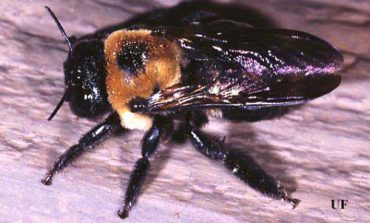

Any insect that has the word “carpenter” in the name is not going to be a good thing. Because as the name implies, it will devour or destroy wood. Most every home is at least partially made of wood. Damaged wood can cause a weaker structure of your home and decrease the value and living comfort as well.
In another post we have already featured the carpenter ant. Much like this species of ant, the carpenter bee will damage the wood in your home. The bee’s purpose for doing so is reproduction. They will lay up to 8 eggs at a nesting location.
There are four species of carpenter bee in Florida. Two are large and two are small. Here are the four species with a brief description:
Ceratina cockerelli – This is a smaller black bee, usually 3.5 – 4.5 mm in length. It can almost look like a very large house fly.
Ceratina dupla floridanus – This bee is a little bit larger (6-8mm long) and has a blue-ish metallic look to it.
Eastern carpenter bee (Xylocopa virginica) – This larger bees is rotund and looks more like a bumble bee than the two previous bees mentioned. It is found throughout the State of Florida but moreso in the northern part of the state.
Southern carpenter bee (Xylocopa micans) – Again, a larger bee with the appearance of a bumble bee. It is found throughout the entire state.
All of these bees have about a one square mile radius. Only the females have stingers and are reluctant to use them. The males and females will usually dive bomb a human that they feel is a threat to their nest, bumping into him/her without actually stinging. The females will revert to stinging if the human does not go away and poses a threat to the nest.
Carpenter bees are all most active in spring and summer. These bees can live up to as long as 3 years. This is one of the few species of bee that allows the female offspring to hang around the nest after they have hatched and even long after, forming what can only be described as a family unit.
These bees are pollinators so they do have a positive function as well. If you have a problem with carpenter bees please call Sunstate Pest. We can take care of your problem in a safe and efficient manner.
– image courtesy of University of Florida
